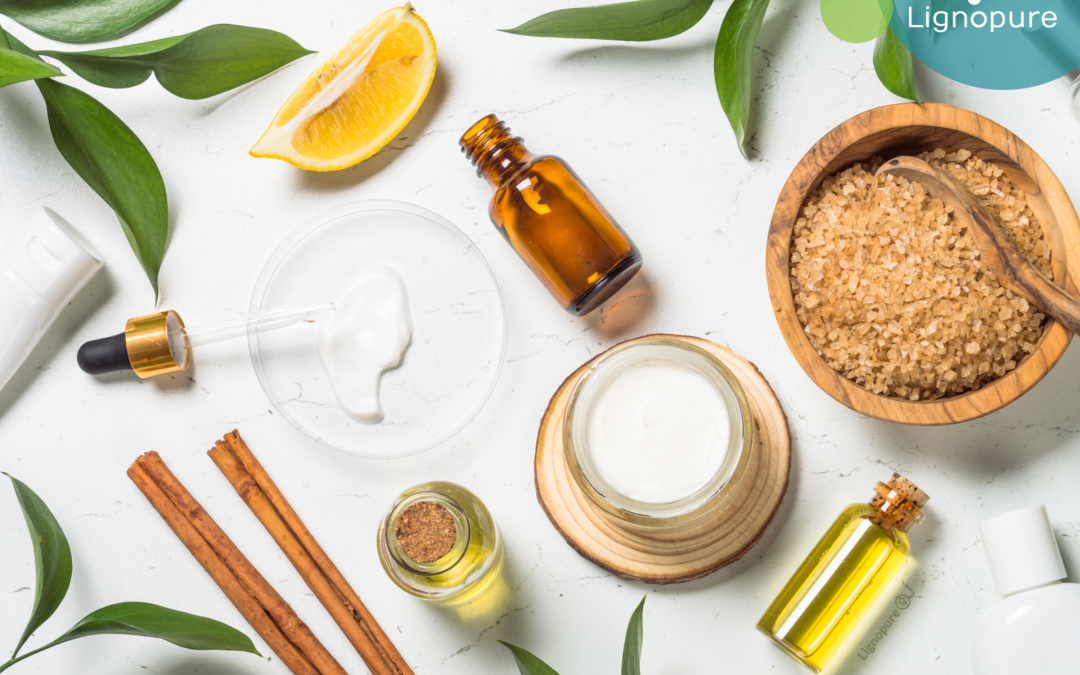
Written by: Gabriela Meza Armenta – Marketing and Business Development Manager at Lignopure
The rise of biobased cosmetic ingredients is largely driven by a growing consumer demand for natural and eco-friendly beauty products. Consumers are becoming more aware of the potentially harmful effects of synthetic ingredients in cosmetics on their health and the environment. Therefore, these consumers are seeking alternatives that are derived from natural and renewable sources.
What is a biobased cosmetic ingredient?
Biobased cosmetic ingredients are derived from natural sources such as plants, minerals, and microorganisms (for example, ingredients produced via fermentation processes). They are an alternative to synthetic or fossil-based ingredients, which are often petroleum-based that have been linked to negative environmental and health impacts. Biobased ingredients are an alternative due to being considered to be safer for human health and more sustainable and eco-friendly than synthetic ones.
Some examples of biobased cosmetic ingredients include:
- Plant-based oils which can be used in moisturizers, lotions, and hair products.
- Extracts from fruits, vegetables, and herbs, which can be used in skincare.
- Natural preservatives such as plant extracts, which can extend the shelf life of cosmetics.
- Biodegradable exfoliants, which can be used in scrubs and body polishes.
- Fermented ingredients, which can be used in skincare to improve skin texture.
Sustainability and regulatory demands for a greener cosmetic industry
In addition to consumer demand, there are also increasing regulatory pressures on the cosmetic industry to reduce the environmental impact of their products. This has resulted in a bigger demand for biobased ingredients to meet these requirements without sacrificing market shares. Also, another industry sector that took advantage of this, were small indie brands that have been the first adopters of the clean beauty movement and have known how to listen the consumer demands and react as soon as possible to them.
In addition to the above-mentioned, there is also a growing body of research supporting the efficacy of biobased ingredients in cosmetics. Many natural ingredients have been shown to have beneficial effects on the skin, such as moisturizing, anti-inflammatory, and anti-aging properties. In contrast with fossil-based ingredients, biobased cosmetic ingredients offer many benefits, such as being gentle on the skin, free from harmful chemicals, and sustainable.
Innovation, the way for more biobased ingredients
Finally, a factor driving the rise of biobased cosmetic ingredients is the increasing availability and affordability of these ingredients. Advances in technology have made it easier and more cost-effective to extract and produce biobased ingredients, making them more accessible to cosmetic formulators and manufacturers. An example of this point is the launching of our LignoBase cosmetic line, which is an upcycled biobased line consisting of three lignin-based powders with multiple benefits for the skin. This line has been possible thanks to Lignopure’s patented particle technology, an innovative first-of-its-kind step towards lignin (a biopolymer in the cell walls of plants) valorization.
Overall, the rise of biobased cosmetic ingredients is a reflection of changing consumer attitudes towards sustainability and environmental responsibility, as well as advances in technology and scientific research.

